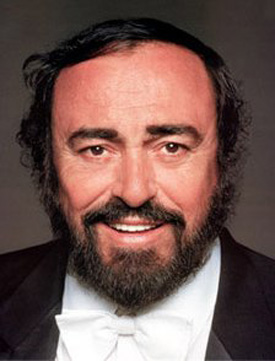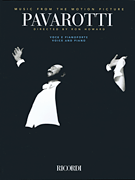In Celebration of the Human Voice - The Essential Musical Instrument
Home | Doo Wop | Barbershop | World | Contemporary | Christian | Vocal Jazz | Choral | Christmas | Instructional | Arrangements
Classical | Opera | Musicals | Personality | Young Singers | Disney | Videos | Songs | The Artists

Solo Arrangements of
Luciano Pavarotti

Luciano Pavarotti was the best-selling classical singer and humanitarian known for his most original and popular performances with the 'Three Tenors' and 'Pavarotti & Friends'.
He was born on October 12, 1935, in Modena, Emilia-Romagna, in Northern Italy. He was the first child and only son of two children in the family of a baker. His father, Fernando Pavarotti, was a gifted amateur tenor, who instilled a love for music and singing in young Luciano. His mother, Adele Venturi, worked at the local cigar factory. Young Pavarotti showed many talents. He first sang with his father in the Corale Rossi, a male choir in Modena, and won the first prize in an international choir competition in Wales, UK. He also played soccer as a goalkeeper for his town's junior team.
In 1954, at the age of 19, Pavarotti decided to make a career as a professional opera singer. He took serious study with professional tenor Arrio Pola, who discovered that Pavarotti had perfect pitch, and offered to teach him for free. After six years of studies, he had only a few performances in small towns without pay. At that time Pavarotti supported himself working as a part-time school teacher and later an insurance salesman. In 1961 he married his girlfriend, singer Adua Veroni, and the couple had three daughters.
Pavarotti made his operatic debut on April 29, 1961, as Rodolfo in La Boheme by Giacomo Puccini, at the opera house in Reggio Emilia. In the following years he relied on the professional advise from tenor Giuseppe Di Stefano, who prevented Pavarotti from appearances when his voice was not ready yet. Eventually Pavarotti stepped in for Di Stefano in 1963, at the Royal Opera House in London as 'Rodolfo' in La Boheme by Giacomo Puccini, making his international debut. That same year he met soprano Joan Sutherland and the two began one of the most legendary partnerships in vocal history; Pavarotti made his American debut opposite Sutherland in February of 1965, in Miami Opera.
Pavarotti was blessed with a voice of a rare range, beauty and clarity, which was best during the 60s, 70s and 80s. In 1966 he became the first opera tenor to hit all nine "high C's" with his full voice in the aria 'Quel destin' in 'La Fille du Regiment' (aka.. The Daughter of the Regiment) by Gaetano Donizetti. He repeated this feat in his legendary 1972 Met performance and was nicknamed "King of the High C's" in rave reviews. Pavarotti's popularity was arguably bigger than that of any other living tenor in the world. His 1993 live performance in the New York's Central Park was attended by 500,000 fans while millions watched it on television. During the 1990s and 2000s Pavarotti was still showing his ability to deliver his clear ringing tone in the higher register, albeit in fewer performances.
Luciano Pavarotti was known for his humanitarian work. He was the founder and the host of the 'Pavarotti & Friends' annual charity concerts and related activities in Modena, Italy. There he sang with international stars of all styles to raise funds for several worthy UN causes. Pavarotti sang with Bono and U2 in the 1995 song Miss Sarajevo and raised $1,500,000 in his charity project 'Concert for Bosnia'. He also established and financed the Pavarotti Music Center in Bosnia, and raised funds in charity concerts for refugees from Afghanistan and for refugees from Kosovo. Pavarotti made two Guinness World Records: one was for receiving the most curtain calls at 165; and the other was for the best selling classical album of 'The Three Tenors in Concert' with Placido Domingo and Jose Carreras.
In March 2004 Pavarotti gave his last performance in an opera as the painter Mario Cavaradossi in Giacomo Puccini's 'Tosca' at the New York Metropolitan Opera. In 2005 Luciano Pavarotti started a 40 city farewell tour. He sang his signature aria 'Nessun Dorma' from 'Turandot' by Giacomo Puccini, at the 2006 Winter Olympics opening ceremony in Turin, Italy, on February 10, 2006. Pavarotti survived an emergency surgery for pancreatic cancer. His remaining appearances for 2006 have been canceled. However, his management anticipated that his farewell tour would resume in 2007.
Luciano Pavarotti died of kidney failure on September 6, 2007, at home in Modena, Italy, where he was surrounded by his family. He was laid to rest with his parents in the family tomb in Montale Rangone cemetery near Modena. His funeral ceremony in Modena was an international event attended by celebrities and over fifty thousand music lovers from all over the world.
Songbooks, Arrangements and/or Media
Displaying 1-2 of 2 items.
Luciano Pavarotti : Pavarotti Forever  The definitive greatest hits recorded by Luciano Pavarotti. An outstanding collection of 18 popular opera arias, sacred songs, and Neapolitan favorites. Songlist: Recondita Armonia, O Paradiso, Mattinata, La Danza, Lamento di Federico, La Mia Canzone al Vento, Ah, La Paterna Mano, Torna a Surriento, E Lucevan le Stelle, Marechiare, Vesti la Giubba, Parigi, o Cara, Rondine al Nido, Che Gelida Manina, Pourquoi me Reveiller, Mamma, M'appari, Donna Non Vidi Mai, O Sole Mio, Nessum Dorma Luciano Pavarotti : Music from the Motion Picture  This collection contains the pieces performed by the great Italian tenor in the biopic docu-film Pavarotti directed by Ron Howard, which was released in June 2019. The tracklist is composed by 23 titles, mostly from the opera repertoire but also from the pop one. This project has been developed in collaboration with Decca Music Group, which has released an album with the same contents. Pieces include: La Danza (Rossini) - La donna é mobile (Verdi) - Una furtiva lagrima (Donizetti) - E lucevan le stelle (Puccini) - Nessun dorma (Puccini) - Questa o quella (Verdi) - and more. |
Select a Category |
Want to Sing? - Find a Chorus Near You
List of Choruses by State | List of Choruses by City


